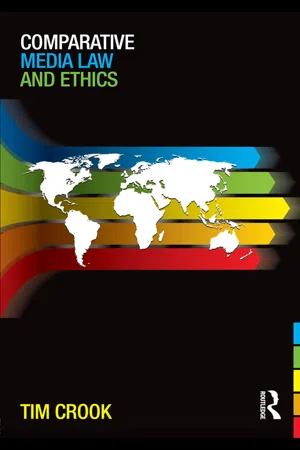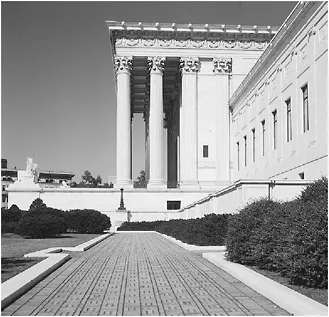1
PRIMARY MEDIA LAW OF THE UK AND USA
The purpose of this book is to investigate the media law and ethics of the United Kingdom and United States of America with some reference to other legal jurisdictions, primarily France, Japan, India, China and Saudi Arabia. The focus on the UK and USA is justified by the fact that the United Kingdom is the source of common law, which has dominated the English-speaking world and the USA is the most powerful cultural, economic, political and military power in the world. US media law and ethics have evolved differently from the UK. This book tries to investigate why this is the case. The book is supported by a companion website at: www.ma-radio.gold.ac.uk/cmle which aims to complement each chapter, and to provide updated information on the topics and multi-media resources to encourage further research and exploration of the subject.
The international perspective is continued through a brief analysis of other media law jurisdictions: common law (India—biggest democracy in the world and largest middle class); civil law (France—influential founder of the European Union and host country for the European Court of Human Rights [ECHR] at Strasbourg); socialist law (China—country with highest economic growth and largest population) and Islamist law (Saudi Arabia—most influential source of legal religiosity). There is consensus at the time of writing that the media law systems of China and Saudi Arabia operate within the context of authoritarian societies, where the nature of democratic accountability is limited in some proportion to the nature of media freedom enjoyed in those countries. Reference is made to media law in Japan because it is the second largest economy in the world and is considered to have a hybrid/composite system of law influenced by the civil and common law doctrines.
The key difference between the UK and USA is that the First Amendment of the US constitution sets out an absolutist principle asserting an unqualified right to freedom of the press. In history and present-day reality the First Amendment does not have an absolute remit, but it does ensure that freedom of expression and media freedom could be said to be more of a trump card in balancing other rights as compared to the situation in the United Kingdom. The UK Parliament at Westminster incorporated the European Convention on Human Rights into legislation in 1998 (enacted October 2000), and Article 10 on freedom of expression is substantially qualified. The contrasting principles are set out in Table 1.1.
Article 10(1) of the Human Rights Act is significantly qualified by 10(2) which states:
The US First Amendment is not qualified in this way. Its absolutist implication prompted the Supreme Court Justices Black and Douglas, in the 1964 case of Sullivan v New York Times, to speculate that the statement that ‘Congress shall make no law’ abridging speech and press freedoms meant Congress could make no law. Sack on Defamation suggested ‘Nothing short of an absolute prohibition of libel judgments against the press would, in
Table 1.1 The differences in defining UK and US freedom of expression
their opinion, assure freedom from verdicts based on the unpopularity of defendants or their ideas and from the limitation on free debate that follows upon such verdicts.’ (Sack 2003:1–9)
Professor Eric Barendt contends that free speech utopia engendered by the idea that there can be no laws restricting the conduct of communication was sensibly scotched when Justice Holmes observed in 1919 that the ‘most stringent protection of free speech would not protect a man in falsely shouting fire in a theatre and causing a panic.’ (Schenck v US, SC US 1919) Barendt believes the Douglas and Black constituency of media jurisprudence is as dead as the dodo:
The prospect of restorative justice
But would it be wise to fully subscribe to Barendt’s eloquent debunking of media freedom absolutism? What would happen in a liberal democracy if, for example, the law of defamation were abolished? Would political and social institutions and the economic infrastructure fail? If it is accepted that the Information Age has generated bottom-up methods of global media publication through Internet and Twitter etc., can it not be argued that any victim of false and unjustifiable attack on reputation has an equal publication remedy? Invasions and abuses of privacy can be handled socially by the ethic of forgiveness and compassion. When a city’s electronic traffic control systems fail, does it necessarily follow that motorists are incapable of socially taking personal responsibility for their driving and avoiding collisions and gridlock? Justices Black and Douglas have left seeds that could develop a much softer body of media jurisprudence and ethics. It is indeed possible and rather exciting to develop a discourse of media power attenuation based on the doctrine of restorative justice. If there were an absolutist First Amendment-style constitutional prohibition against media laws in the UK and the USA, could they not be replaced by a constitutional process of restitution, apology and right to reply?
All of the capitalist disincentives of media legal costs engendering ‘chilling effects’ and Strategic Lawsuits Against Public Participation could be eradicated. Publishers and claimants, including government and judicial authorities, could consent to a participation in quasi-legal and regulatory rituals of arbitration, understanding and apology, negotiated in supervised conferences. Disputes between publishers and complainants would be solved by discussion and, where necessary, restitution by apology and retraction.
Roots of US media freedom culture
R.Bruce Rich writes that the roots of media freedom have been planted in United States history and culture very deep indeed:
The political philosophical spirit underpinning these words is rich with the heritage of John Locke, Thomas Paine, Jeremy Bentham and John Stuart Mill. In contrast, Nick Braithwaite was writing in 1995 that part of the explanation of media libel defendants having such a hard time in England lies in the nature of Britain’s unwritten and disordered constitution:
The debate between the rights of a free media and the reputation and privacy interests of private citizens, public figures, corporations and state bodies is undoubtedly the backbone to the analytical discourse of this book. Both corners have varied and intriguing constituencies of argument and opinion. Rich asserts that the marketplace of ideas should be expected to be rough and tumble, cut and thrust, and should accept the irresponsible in human communication as much as the responsible:
It remains a fact that there are more people in the world not enjoying the liberties and freedom of democracy experienced by UK and US citizens. My father, Captain John H.Crook, died in 1986 with a copy of Alexander Solzhenitsyn’s forensic exposure of the injustice of Soviet persecution of political dissent on his bed. And he once told me in his last days that we should never forget one of the lessons of his life: ‘There are only two steps from tyranny: the first is when you deny a journalist the right to ask unpopular questions; the second is when you deny a lawyer the right to defend unpopular causes.’ This is what he fought for on the battlefield of Normandy in 1944 and for which many of his fellow officers and soldiers died.
In the USA and UK there has been a battle over just how much supremacy ‘freedom of expression’ and ‘freedom of speech and the press’ have over other rights. It would appear that the US First Amendment has been given priority in many Supreme Court rulings. But as the British journalist and media law Professor Marcel Berlins observed, the situation in Britain is a matter of conjecture:
Media communicators in Britain may argue that Hoffmann’s hoped-for ace of spades has turned into something of a joker. Despite a plethora of rhetoric on how important to democracy freedom of expression is, the legal game at the time of writing would appear to operate as a balancing exercise, with the conduct and content of media publication subject to an intense focus and every case being decided on its merits. But it might be argued that the jurisprudential opportunity to make freedom of expression the paradigm in any balancing exercise is provided by the 1998 Human Rights Act legislation. When the proposed act was being debated in Parliament, the then chairman of the Press Complaints Commission, Lord Wakeham, successfully inserted Section 12(4), which states:
The legislation appears to give the media in Britain the opportunity to take the initiative on what privacy means. In their professional codes they can nuance and redefine the nature of privacy in the context of media communication. Furthermore, media lawyers can argue much more strongly that this statutory power emphasizes particular regard to the importance of freedom of expression. But the courts argue they have been compelled to recognize a legal right to respect for privacy because sections 2 and 6 of the Human Rights Act 1998 oblige them to take into account ECHR jurisprudence and give effect to convention rights. The right to reasonable expectation of privacy for private information has been grafted onto the existing law of confidentiality. The courts also have to qualify particular regard to freedom of expression in section 12(4) with public interest justification and a balancing exercise with the right to respect for privacy.
It could also be argued that, as Parliament has not statutorily defined ‘public interest’, media communicators and journalists could wrestle the initiative on the definition from the judiciary through their professional codes. The jurisprudential and journalistic lexicon on defining ‘public interest’ and ‘public concern’ is elastic and rich in British and overseas sources. Several senior judges in Britain in Court of Appeal and House of Lords rulings have underlined the concept of public interest lying in a marketplace of ideas that has to recognize popular ...






